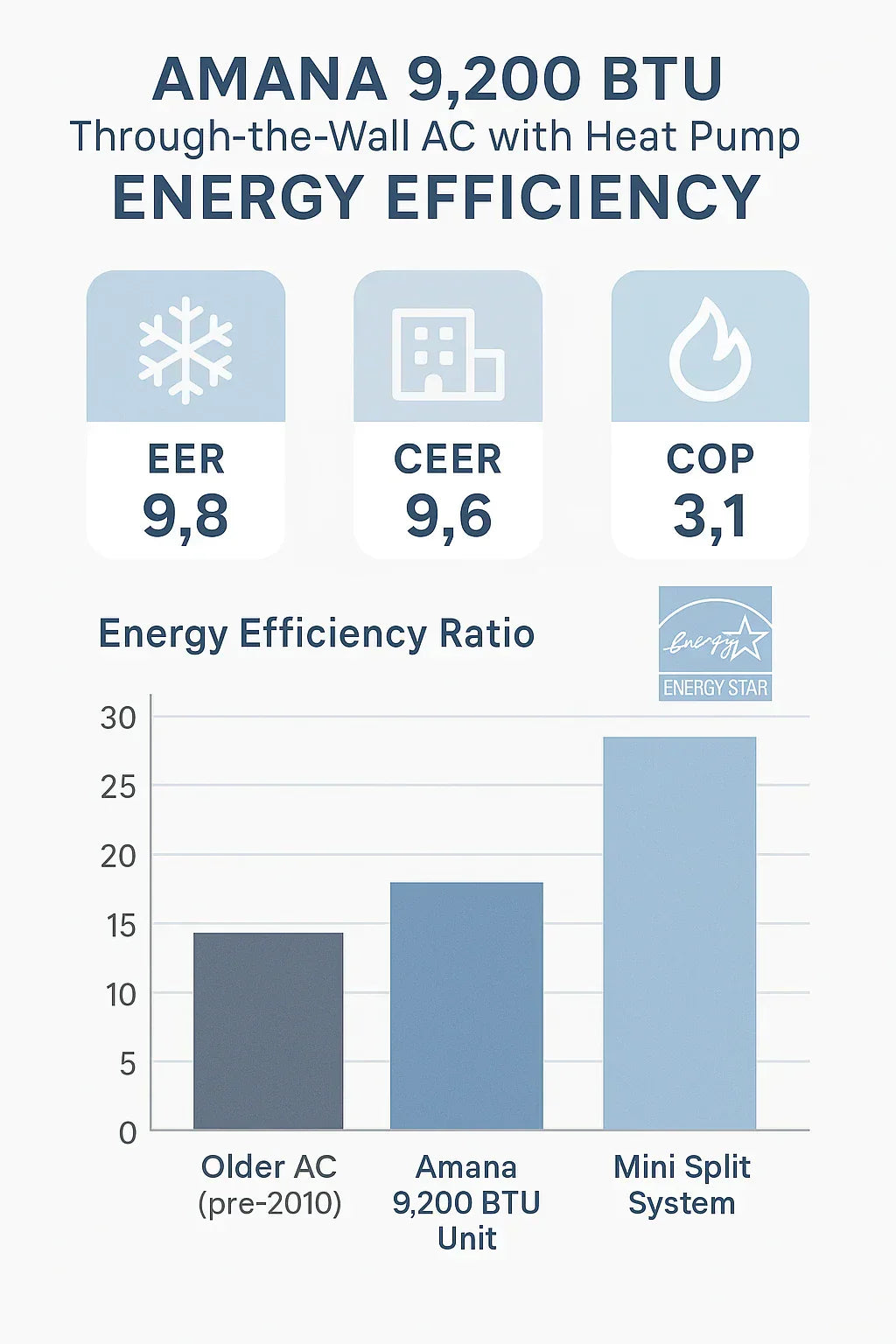🔎 Introduction: Why Efficiency Ratings Matter More Than Ever
Energy efficiency isn’t just about reducing your utility bills — it’s about getting more comfort with less waste. For homeowners like Mark, evaluating HVAC equipment means understanding terms like EER, CEER, COP, and HSPF2 — and knowing how they translate into real-world performance.
The Amana 9,200 BTU Through-the-Wall AC with Heat Pump is a compact, versatile unit designed for year-round use. But how does it really perform when it comes to energy savings?
In this guide, we’ll explore:
-
What each rating means (and what it doesn’t)
-
The actual specs of the Amana unit
-
How it compares to mini splits and older systems
-
Whether it qualifies for ENERGY STAR or tax credits
-
What you’ll save in the long run
📐 1. EER vs. CEER vs. SEER: What’s the Difference?
Let’s break it down simply:
| Rating | What It Stands For | Applies To | Measures |
|---|---|---|---|
| EER | Energy Efficiency Ratio | AC only | BTUs per watt at 95°F outdoor temp |
| CEER | Combined EER | AC with controls | BTUs per watt incl. standby/power loss |
| SEER2 | Seasonal Energy Efficiency Ratio (newer) | Central/Mini Split ACs | Seasonal average cooling output per watt |
✅ For Through-the-Wall Units:
-
EER is the most common rating you'll see
-
CEER includes the energy consumed by electronics in standby mode
-
The higher the number, the more efficient the unit
🔗 ENERGY STAR CEER Criteria for Room Air Conditioners
🌬️ 2. What’s the Amana 9,200 BTU Unit’s Real Efficiency?
Based on published specs:
-
Cooling Capacity: 9,200 BTUs
-
EER: ~9.8
-
CEER: ~9.6 (varies slightly by model)
-
Heating Type: Reversible heat pump
-
COP (Coefficient of Performance): ~3.1
-
HSPF2 (Heating Seasonal Performance Factor): ~7.8
These numbers put it in the mid-range of efficient for its category — better than older units, but not as high as premium mini splits.
💡 3. How Do These Numbers Compare?
✅ Room Air Conditioner (Through-the-Wall)
| Unit Type | EER Range | CEER Range |
|---|---|---|
| Old units (pre-2010) | 7–8 | Not rated |
| ENERGY STAR rated | ≥9.8 | ≥9.7 |
| Amana 9,200 BTU | 9.8 | 9.6 |
✅ Mini Split (Ductless)
| Unit Type | SEER2 Range | HSPF2 Range |
|---|---|---|
| Base models | 17–20 | 8–10 |
| High-efficiency | 22–30+ | 11–13+ |
🔗 Energy Vanguard: Efficiency Ratings Explained
⚡ What Do These Ratings Mean for Your Bills?
Let’s run the numbers:
🧮 Example: Cooling with Amana 9,200 BTU for 8 Hours Daily (Summer)
-
Power draw: 940 watts (approx.)
-
Energy used per day: 7.52 kWh
-
Monthly usage: ~225 kWh
-
At $0.15/kWh = $33.75/month
🔥 Example: Heating in Mild Winter with Heat Pump
-
COP: 3.1 = 3.1 units of heat per unit of electricity
-
Better than baseboard heaters (COP ~1.0)
-
Monthly usage: ~$40–$60 depending on climate
🛠️ Older units with EER of 7 would cost ~25% more to run
🌱 What Is COP and Why Does It Matter?
⚖️ COP = Coefficient of Performance
It’s a ratio of heat output to energy input. The higher, the better.
| COP | Description |
|---|---|
| 1.0 | Typical electric heater (100% efficiency) |
| 2.0–3.0 | Standard heat pump |
| 3.5+ | Inverter-driven mini split (very efficient) |
🔗 DOE – Understanding Heat Pump Performance
🏆 Is the Amana 9,200 BTU Unit ENERGY STAR Certified?
Yes — most models in this line meet ENERGY STAR minimums:
-
EER ≥ 9.8
-
CEER ≥ 9.7
Why it matters:
-
ENERGY STAR units use ~10% less energy
-
May qualify for utility rebates
-
Ensures reliable minimum standards
🔗 ENERGY STAR Room AC Requirements
💸 Tax Credits & Rebates: Does It Qualify?
Federal Tax Credits (Inflation Reduction Act - 2025)
-
Most rebates apply to ducted or ductless central heat pumps, not through-the-wall units
-
However, some utility or state programs include high-efficiency through-the-wall AC/heat pump combos
🔗 DSIRE – State Rebate Directory
Local Utility Rebates:
-
Varies by region
-
Search using zip code + “through-the-wall AC rebate”
-
ENERGY STAR rated units are most eligible
🛠️ Tip: Keep your purchase receipt and model/serial number for rebate forms
🛠️ Real-World Efficiency Tips from Mark
“The Amana unit gives great bang for your buck if you’re cooling or heating one room. You won’t find mini split-level efficiency, but you’ll save plenty compared to running a space heater or older wall unit. Just make sure your wall sleeve is sealed tight — leaks kill efficiency.”
⚙️ Efficiency Enhancers to Maximize Performance
-
Insulate around wall sleeve: Prevents drafts and energy waste
-
Clean the filter monthly: Clogged filters increase runtime
-
Use programmable settings: Avoid cooling or heating empty rooms
-
Seal nearby windows and doors: Reduces heat loss/gain
🔗 Amana AC Maintenance Guide (PDF)
✅ Final Verdict: Is It Efficient Enough?
If you're cooling a single room or heating a small space in a mild to moderate climate, the Amana 9,200 BTU unit delivers:
✅ ENERGY STAR compliance
✅ Efficient heat pump operation
✅ Affordable installation and operation
✅ Great upgrade over older units
❌ If you need whole-home heating/cooling or want tax credits, a high-SEER mini split may be a better fit long-term.
In the next topic we will know more about: Installing a Through-the-Wall AC with Heat Pump: Can You DIY or Should You Call a Pro?







